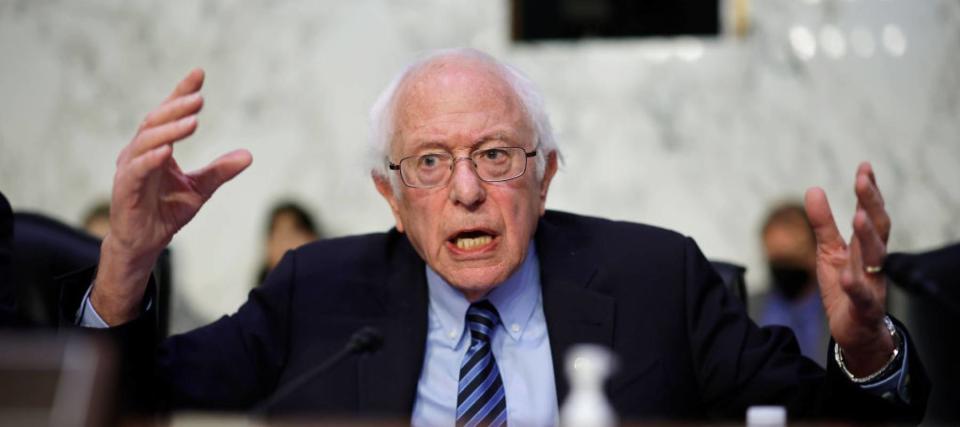'This situation has become so absurd': Bernie Sanders slams world's top hedge fund managers — here are 3 of the richest and what they invest in

Bernie Sanders, Vermont senator and self-described democratic socialist, recently took yet another shot at one of his favorite targets: the filthy rich.
Don’t miss
Rich young Americans have lost confidence in the stock market — and are betting on these 3 assets instead. Get in now for strong long-term tailwinds
You could be the landlord of Walmart, Whole Foods and CVS (and collect fat grocery store-anchored income on a quarterly basis)
Worried about the economy? Answer these 3 quick questions to find the best shock-proof assets for your portfolio. (They're all outside of the stock market.)
“The top 15 hedge fund managers on Wall Street make more money in a single year than every kindergarten teacher in America combined — over 120,000 teachers,” Sanders said in a video posted on Twitter and YouTube in February. He claimed the starting salary for teachers in almost 40% of school districts was less than $40,000 and that 43% of teachers overall made less than $60,000 in salary.
The top 15 hedge fund managers, meanwhile, earned $13.8 billion last year, according to an analysis by Bloomberg.
“This situation has become so absurd,” Sanders argued.
Of course, teachers and hedge fund managers earn their money in different ways, which makes this an apples-to-oranges comparison. Unlike teachers, hedge fund managers can lose money in any given year if their fund has clawback clauses and no management fees. Hedge fund compensations are linked to performance, which implies that the most well-paid and richest hedge fund managers are also the best performers.
Top hedge fund managers
With that in mind, here are three of the richest money managers in the world, and what they’re currently betting on.
Ray Dalio
Net worth: $19.1 billion
As of March, Ray Dalio holds $19.1 billion in personal wealth, making him one of the top 100 richest people in the world. He runs Bridgewater Associates, one of the largest hedge funds in the world.
According to the firm’s latest 13F filing, Dalio’s team was adding banks like JP Morgan Chase (JPM) and Bank of America (BAC) to the portfolio. Meanwhile, Procter & Gamble (PG) was one of the largest acquisitions worth 4.13% of the firm’s total portfolio.
Read more: Owning real estate for passive income is one of the biggest myths in investing — but here is 1 simple way to really make it work
Jim Simons
Net worth: $28.1 billion
Jim Simons is the second-wealthiest on this list, worth nearly $10 billion more than Ray Dalio. He runs New York-based hedge fund Renaissance Technologies.
Simons recently added more shares of Apple (AAPL) to the portfolio, while the biggest holding in the portfolio is Novo Nordisk (NVO). However, the fund’s investment strategy is notoriously complicated and based on statistical patterns and non-random events in the market. That’s why the equity portfolio may not explain Simon’s overall exposure to the market.
Ken Griffin
Net worth: $35 billion
Ken Griffin is the wealthiest hedge fund manager of the three, and it’s not particularly close. Much of this can be attributed to his enormous 80% stake in the Miami-based hedge fund Citadel Securities.
After gaining $16 billion on its investments last year, Citadel became the most successful hedge fund in the world in 2022. The firm bought Netflix stock recently, according to its latest 13F filing. Meanwhile, the largest and smallest positions in the portfolio are put and call options on the S&P 500 (SPY), which suggests that the fund’s investment strategy is a complicated mix of derivatives.
An important caveat
Hedge fund portfolios are complicated. What we know is based on regulatory filings like the Form ADV and the 13F. These forms are filed quarterly, which means the positions may have changed substantially by the time retail investors like us learn about it. They also don’t include details about derivatives such as options, futures or leverage. That means a hedge fund’s true position in a company is difficult to discern.
The strategic moves of successful hedge funds could offer broad clues about the market’s economic outlook, but shouldn’t be an integral part of a retail investor’s personal investment strategy.
What to read next
Blackrock’s CEO says art is a ‘serious asset class’ — here’s how you can own a piece of a Pablo Picasso
Your cash is trash: 4 simple ways to protect your money against white-hot inflation (without being a stock market genius)
Want to invest your spare change but don't know where to start? There's an app for that
This article provides information only and should not be construed as advice. It is provided without warranty of any kind.
